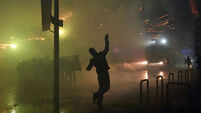Immigrants flex their muscles in the US
Today has been set aside for immigrants in the US to boycott work, school and shopping to show how much they matter to their communities. But with some growing tired of street protests, and others afraid they’ll be deported or fired for walking out, people are planning to support the effort in myriad ways.
Some will work but buy nothing today. Others will protest at lunch breaks or at rallies after work. There will be church services, candlelight vigils, picnics and human chains.














